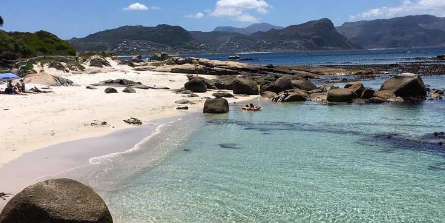Minister of Tourism, Tokozile Xasa applauded the 44 beaches that have obtained full Blue Flag status along with 11 sustainable boats and seven marinas, during a beach certification programme held at Dolphin Beach, Jeffreys Bay, Eastern Cape.
The Western Cape has achieved the highest number of Blue Flag sites this year, with 28 of the 44 beaches, all 11 boats (tourism boats that do environmental tours and educational programmes), and six of the seven Blue Flag marinas falling in the province. This is an increase of three Blue Flag boats from the previous season, and one additional marina.

“We are re-awarding Blue Flag status to some of the beaches that lost their Blue Flag status in the 2016/17 season. I would like to attribute this achievement to the Department’s Blue Flag Beach Steward project, which places young people on these beaches to maintain their Blue Flag standards,” said Minister Xasa.
The beaches that were re-awarded Blue Flag Status are:
- Wilderness Beach Eden Municipality
- Gouritzmond Beach Hessequa Municipality
- Santos Beach Mossel Bay Municipality
- Struisbaai Beach Agulhas Municipality
- Singing Kettle Beach Bitou Municipality
The Department of Tourism, in partnership with Wildlife and Environment Society of South Africa (WESSA), launched the Blue Flag Beach Steward project in October 2016. It is a 28-month-long initiative aimed at training 200 youths from low-income coastal households in the National Certificate in Environmental Education Training and Development Practices NQF 5, specialising in Tourism.
The beach stewards provide local member municipalities with adequate infrastructural support to maintain the required high standards of safety, environmental management, water quality and environmental education at Blue Flag sites, as well as assist other beaches to attain this prestigious status.
The Blue Flag Beach Steward programme is part of the Coastal and Marine Tourism Implementation Plan, which is a focus area of Operation Phakisa’s Oceans Economy. The plan aims to grow a world-class and sustainable coastal and marine tourism destination that leverages off South Africa’s competitive advantage in nature, culture, and heritage.
“The coastal and marine tourism sector will contribute about R21.4 billion (€1.3bn) to the GDP and create about 116 000 direct jobs by 2026, thus reducing poverty, inequality and unemployment, while contributing to sustainable livelihoods and development. These estimates are conservative as they are growing from a low 2015 base of R11.9 billion (€730 mil) direct contribution to GDP and 64 400 direct jobs,” concluded the Minister.























